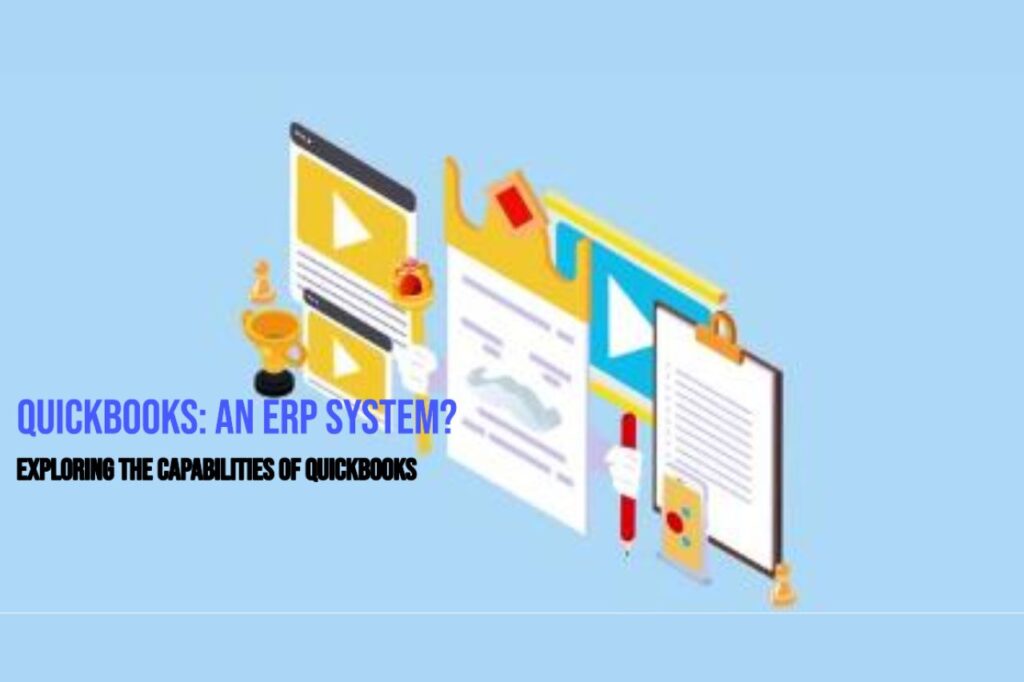You’ve likely heard of QuickBooks, especially if you’re a small to medium-sized business owner or a bookkeeping professional. It’s a dominant name in the world of financial software. But with the ever-evolving nature of business software, one question continues to emerge: Is QuickBooks an ERP system? Let’s delve deep into this question, comparing the features, uses, and benefits of both platforms.
What is QuickBooks?

QuickBooks, developed by Intuit, is a comprehensive accounting software designed to help businesses manage their financial data. It offers various features like invoicing, payroll, expense tracking, and financial reporting. QuickBooks has become the go-to solution for many small to medium-sized businesses thanks to its user-friendly interface and vast integration capabilities.
Understanding ERP Systems
Enterprise Resource Planning (ERP) systems are integrated software platforms that manage various business processes in an organization. This includes finance, human resources, procurement, and more. A typical ERP system like the you can find in the SAP training program centralizes business data, streamlines processes, and fosters collaboration among different departments.
Is QuickBooks An ERP System: Main Differences Between QuickBooks And ERP Systems
While there’s some overlap, here are the major distinctions:
- Scope: QuickBooks primarily focuses on accounting. In contrast, an ERP covers a wider range of business processes.
- Integration: QuickBooks can integrate with various tools, but ERPs are inherently designed to unify multiple business functions.
- User Base: QuickBooks is mostly popular among SMBs (Server Message Block), whereas ERP systems are often used by medium to large enterprises.
When Might QuickBooks Feel Like An ERP?
There are instances when QuickBooks might feel like an ERP, especially with the rise of QuickBooks Online Advanced. This version offers features such as custom roles, enhanced reporting, and workflow automation. For smaller businesses, these capabilities might be enough to equate QuickBooks to an ERP system.
Advantages Of Using QuickBooks
- Cost-Effective: One of the primary reasons many businesses choose QuickBooks is its affordability compared to full-scale ERP systems.
- Ease of Use: Its intuitive interface makes it easy for users to navigate and manage their financial data.
- Integration Capabilities: QuickBooks integrates seamlessly with various third-party tools, enhancing its functionality.
Benefits Of ERP Systems
- Unified Platform: An ERP system brings all business functions under one umbrella, ensuring seamless data flow and increased efficiency.
- Scalability: ERPs can handle the needs of growing businesses, adapting to increased data and more complex processes.
- Enhanced Collaboration: With data centralized, different departments can collaborate more effectively, reducing errors and boosting productivity.
Who Should Opt for QuickBooks?
If you’re a small to medium-sized business primarily looking for an accounting solution with some added functionality and don’t foresee rapid growth in the immediate future, QuickBooks might be the optimal choice.
Who Should Opt for an ERP System?
For medium to large enterprises, or businesses that anticipate rapid growth and require a unified system to manage various departments, an ERP system would be more fitting.
Transitioning From QuickBooks To An ERP
It’s not uncommon for businesses to outgrow QuickBooks. If you’re considering making the leap to an ERP system, ensure you analyze your current and future needs, consult with an IT expert, and choose a platform that aligns with your business objectives.
Cost Implications
Transitioning from QuickBooks to an ERP can be costly. However, the long-term benefits, like increased efficiency, unified data, and scalability, can outweigh the initial investment.
What Others Want To Know About ERP
Q: When should a business consider transitioning from QuickBooks to an ERP system?
When the company grows, diversifies, or needs more integrated and extensive system capabilities, it might be time to consider a shift to an ERP solution.
Q: Are there any hybrid solutions that bridge QuickBooks and ERP functionalities?
Yes, some software solutions combine QuickBooks’ accounting strengths with broader ERP-like capabilities. It’s essential to research and find the best fit.
Q: In terms of data security, how does QuickBooks compare to ERP systems?
QuickBooks Online uses robust encryption and security measures. However, ERP systems, given their broader scope, often have more extensive security features.
Q: Is it challenging to migrate from QuickBooks to a full ERP system in the future?
Migration complexity varies. With the right ERP partner and proper planning, data transfer and system integration can be streamlined effectively.
Also check my other blog on content creation for starters. In this blog you can get the basic information and guidance you need to start your content writing career
Conclusion
So, is QuickBooks an ERP system? The simple answer is no. While QuickBooks is a powerful accounting tool with some functionalities that may resemble those of an ERP, it doesn’t have the broad scope that characterizes ERP systems. Businesses should weigh their needs, size, and growth trajectory when choosing between QuickBooks and a full-scale ERP system. Regardless of the choice, both platforms offer unique advantages designed to boost business efficiency and productivity.




